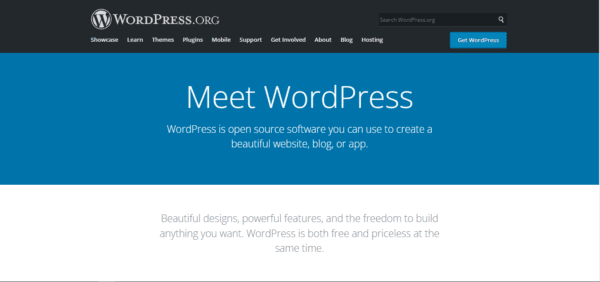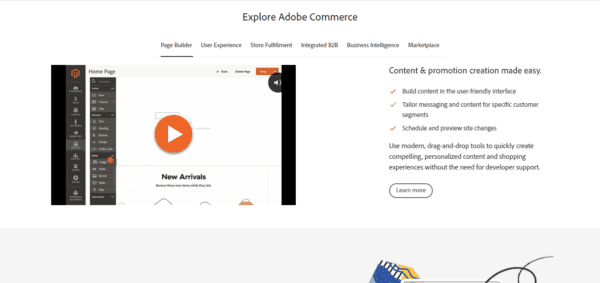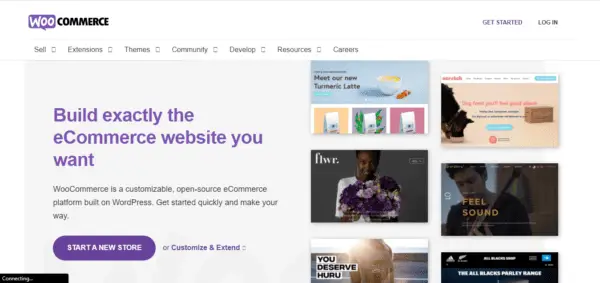The best eCommerce platforms are growing at an astonishing pace, and it’s predicted to grow even further in the coming years. Due to this, more companies and individuals are venturing into eCommerce.
When starting an eCommerce website, one of the first things you would have to think about is the CMS platform for you. If you want to run an eCommerce website, especially if you’re not very tech-savvy, i.e. cannot code, a CMS and an eCommerce platform would be your best bet.
So, as a budding eCommerce store owner, your first thought or first search would be; “the best eCommerce CMS or platform to use”.
In this article, we’re going to discuss the best eCommerce CMS for your online store. But before we go into that, there are some important things you need to know before choosing an eCommerce CMS. One of them is:
What is an Ecommerce CMS?
Before delving into what an eCommerce CMS is, let us discuss first what a CMS is. A CMS (Content Management System) is software that allows website owners to create, edit, and generally manage their website without writing any code.
Fusing this translation, we can say an eCommerce CMS is software that lets you manage your eCommerce store without writing any code. With an eCommerce CMS, you can create or recreate your store in terms of style, page layout, additional sections, etc. You can manage the aesthetics on your site, both textually and pictorially.
Before you ask the question, the answer is no and yes. A CMS software does not handle the product management on your eCommerce website. While an eCommerce CMS does this. This means a CMS is an entity on its own, while an eCommerce CMS isn’t. Although in some cases, some CMS software can allow integration with major eCommerce platforms like Shopify, etc.
There are two distinct categories of eCommerce CMS software.
- Open-source CMS.
With open-source eCommerce platforms, you have full autonomy over the functioning of your website. You download the software and host it yourself. This means as an eCommerce store owner, you’re solely responsible for figuring out your eCommerce website. And by figuring out we mean, the general maintenance, servicing and installation of any software update. An example of an open-source CMS is Magento and WooCommerce. - SaaS hosted CMS.
SaaS on the other hand is completely different from open source. With a hosted SaaS CMS you as an eCommerce do not need separate servers. With a SaaS eCommerce content management system CMS, all you need to do is pay a subscription fee and everything else is managed by the eCommerce platform. You don’t need to manage the platform, update software or set up any form of data storage. All of these and more are taken care of by the software vendor.
In addition to all of these, you also get customer support and other perks. An example of a SaaS hosted CMS is Squarespace, Shopify, BigCommerce, etc. These are also examples of CMS software as well as eCommerce platforms.

Best Ecommerce Platforms for Your Ecommerce Store
WordPress

WordPress is one of the widely used CMS software. WordPress on its own isn’t an eCommerce platform. To be able to run an eCommerce online store with WordPress, you’d need to integrate it with eCommerce platforms such as Shopify, WooCommerce, BigCommerce, etc.
WordPress also comes with an assortment of free and paid plug-ins that can do a world of good for your eCommerce platform. While WordPress allows integrations with eCommerce shops, you also have the opportunity to customize it however you like, provided you know basic code such as CSS and HTML.
Magento

Magento is one of the biggest players in open source eCommerce CMS. Magento runs on PHP and eCommerce store owners you are provided all the room you need to build your eCommerce store with ease. Doesn’t matter if you’re just starting your eCommerce store or if you’re a long-term player looking for an open-source CMS, Magento is a CMS that serves these functions. Magento also allows integration with several third-party extensions, hereby creating a unique personalized experience.
Magento is SEO-friendly and has incredibly fast loading speeds, as an eCommerce store owner with Magento you can customize and edit almost anything, all data is available to you, etc. Magento also has a community with over 350,000 users providing support for each other.
While Magento has many great attributes some of which are listed above, it also has its cons, e.g. Magento websites need hosting, and it is complicated to use. If you’re not tech-savvy you may want to check other SaaS platforms. Magento’s plans are expensive compared to other eCommerce platforms.
Shopify

Shopify is a great SaaS eCommerce CMS platform with a staggering number of features. It doubles as a CMS and an eCommerce platform. In Shopify’s last report, they stated that over 800,000 businesses use Shopify. Shopify is often regarded as a full-suite eCommerce platform. With Shopify, you can set up your eCommerce store, handle your products and manage everything in your online store from a single dashboard. Shopify is an eCommerce platform that also offers free integration with eBay and Amazon.
With Shopify, you can use your custom domain name, have access to their content management system, use the Shopify app to manage your store from anywhere, handle multiple orders with ease, and sell via Facebook, etc. They also offer 24/7 customer care support.
Some of the cons with using Shopify include: many of their themes aren’t free, and to customize them properly you might need the help of a professional. Shopify only has phone support for customers in the US, UK, New Zealand, and Australia.
WooCommerce

WooCommerce is a major contender in the eCommerce marketplace. WooCommerce controls a staggering 22% of the top 1 million eCommerce websites. WooCommerce integrates easily with WordPress. WooCommerce has several free themes. They also have mobile apps that aid their management.
To properly use WooCommerce, you’d need to properly understand its service and WordPress as well, It comes with some paid extensions, it only works with WordPress themes and some of its plug-ins don’t function properly with WordPress.
BigCommerce

BigCommerce is another great CMS option if you’re looking to start your online store. BigCommerce has a lot of built-in features and multiple customization options as well. Over 55,000 eCommerce stores use BigCommerce, from the likes of Toyota, Martha Stewart, to people just starting on their eCommerce journey.
BigCommerce is extremely easy to use with its drag and drop options, mobile optimization, WordPress integration, easy checkout, etc. BigCommerce is also SEO friendly and has a wide variety of themes and a built-in blog.
While BigCommerce has a lot of these great functionalities, it’s also more expensive when compared to regular eCommerce platforms.
Squarespace

Squarespace is a great eCommerce CMS platform that allows people to build eCommerce stores without any knowledge of code. It has great easy-to-use drag and drop templates. With Squarespace’s widgets, you can add a variety of multimedia options. There are lots of integration that helps users get the best out of the platform.
With Squarespace, you can sell an unlimited amount of products, collect customer emails for marketing options, automate sales to be repeated on weekly or monthly subscriptions.
Prestashop

Prestashop is a free open source eCommerce CMS software for eCommerce store owners. Prestashop offers fully-hosted or self-hosted versions. This lets you determine your level of technical control. With Prestashop, there are lots of built-in functionality that allows store owners to customize their store with a variety of plug-ins and themes. Prestashop lets you customize almost all the pages in the eCommerce CMS. You can also create categories and subcategories with ease.
Prestashop is great only for small and medium scale enterprises, hence, it doesn’t scale effectively. Also, the add-ons in Prestashop eCommerce CMS aren’t well suited for large-scale stores or brands that grow rapidly. Lastly, the add-ons are more expensive compared to other platforms.
What to Consider Before Choosing an Ecommerce CMS for Your Online Store
When choosing an eCommerce CMS, there are things you have to look out for. Some of these things vary depending on what your brand and company vision is. With further ado, here are some vital things to consider.
1. How easy is it to use?
Some CMS platforms come with drag and drop features that make it easy for almost everyone to use. You don’t have to be extremely tech-savvy to use them. If you don’t have a team of engineers and don’t know code yourself, this feature should be a top priority on your list. If you have an in-house developer, then it is completely fine to go for a more complex open source eCommerce CMS.
2. Pricing
Some eCommerce CMS costs around $20 a month, while others enter the threshold of thousands of dollars monthly. You need to decide your budget and this will help you pick the most important and necessary features for your eCommerce business.
3. SEO
SEO is a really important aspect of any online enterprise. You need to make sure whichever eCommerce CMS you use is SEO-friendly and will not hinder your hard work. Any platform you choose should follow SEO best practices and should offer advanced modules and plug-ins to help increase your ranking.
4. Support
It is normal to encounter problems with your eCommerce CMS. Hence, when choosing CMS software, you want to make sure they have active customer support that will help you manage your accounts in the case of any problem.
5. Community
This is optional, but a CMS with a large community is important as you get to meet lots of people that use the product and will be able to offer you real-time suggestions and first-hand help.
Conclusion
Before deciding on a CMS to use, you also need to make sure to decide if you want a CMS platform that doubles as an eCommerce platform or if you strictly want to integrate your eCommerce platform to a CMS.
We’ve discussed the best eCommerce platforms for you to use. It’s left to you to make the decision on which better serves your brand and vision at large.





